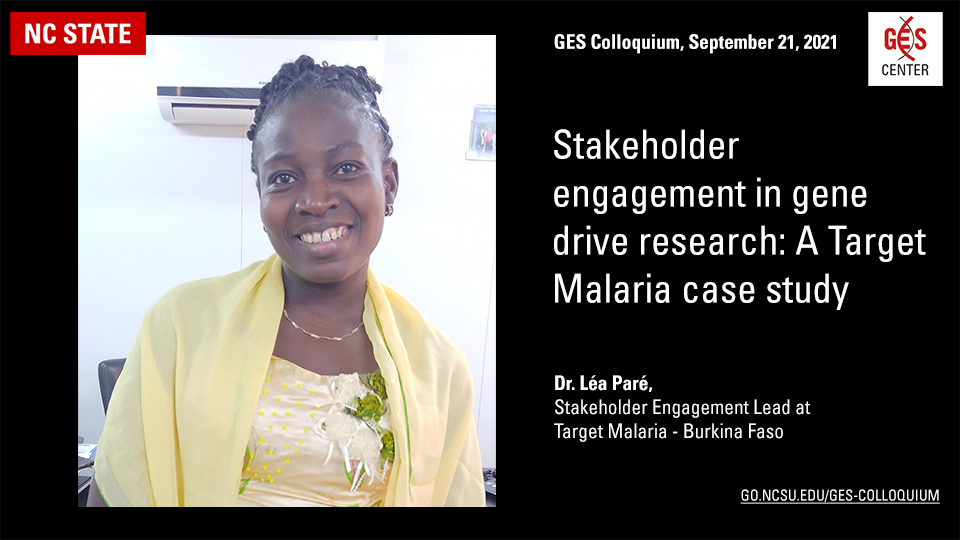
- This event has passed.
Léa Paré – Stakeholder engagement in gene drive research: A Target Malaria case study | GES Colloquium

Colloquium Home | Zoom Registration | GES Video Library (current) | Video Archives | Podcast | @GESCenterNCSU | Newsletter
Stakeholder engagement in gene drive research: A Target Malaria case study
Dr. Léa Paré, Stakeholder Engagement Lead at Target Malaria – Burkina Faso
Website | Twitter @TargetMalaria
Target Malaria’s approach to stakeholder engagement is an iterative process, constantly adapting and evolving based on the context and values of our stakeholders, as well as new guidance and recommendations developed in accordance with international best practice.
Abstract
Stakeholder engagement is one of the three pillars of Target Malaria’s approach. Our strategy is to focus on the communities that might benefit from the technology and that are directly affected by the research activities but also to have an ongoing, transparent dialogue with other stakeholders. The project uses ethically designed engagement best practices to empower these communities to make the most informed decisions about the project’s work and its activities. Our stakeholder engagement approach is an iterative process, constantly adapting and evolving based on the context and values of our stakeholders, as well as new guidance and recommendations developed in accordance with international best practice.
Related links:
Speaker Bio
Dr. Léa Paré obtained her doctorate in anthropology / sociology at the University of Aix Marseille 2 in France. She is Target Malaria’s Stakeholder Engagement Lead in Burkina Faso. Throughout her training and career, Dr. Paré has developed a great interest in the field of research on malaria from an anthropological point of view. Dr. Paré’s doctoral research enabled her to specialize in the socio-anthropological analysis of health problems in Africa. Author of several publications since 2000, she is interested in questions of social representations of malaria in connection with the acceptance of the means of control developed by science and technology. Her various works have underlined the need to think ahead for fundamental research in malaria control and to look at the perceptions, expectations and constraints of populations in relation to the use and allocation of research results by the beneficiary populations. Dr. Paré is one of the forerunners of the social sciences who are interested in the problems of genetically modified organisms from the point of view of local communities and stakeholders.
GES Colloquium is jointly taught by Drs. Dawn Rodriguez-Ward and Jen Baltzegar, who you may contact with any class-specific questions. As conditions allow, colloquium will be held in-person in Poe 202, as well as live-streamed via Zoom. Please subscribe to the GES newsletter for updates (links above).
WordPress database error: [Unknown column 'wp_tec_occurrences.start_date' in 'SELECT']SELECT SQL_CALC_FOUND_ROWS wp_posts.*, CAST( wp_tec_occurrences.start_date AS DATETIME ) AS event_date
FROM wp_posts LEFT JOIN wp_term_relationships ON (wp_posts.ID = wp_term_relationships.object_id) LEFT JOIN wp_postmeta ON ( wp_posts.ID = wp_postmeta.post_id AND wp_postmeta.meta_key = '_EventHideFromUpcoming' ) LEFT JOIN wp_postmeta AS mt1 ON ( wp_posts.ID = mt1.post_id )
WHERE 1=1 AND wp_posts.ID NOT IN (16534) AND (
wp_term_relationships.term_taxonomy_id IN (149,521,802)
OR
wp_term_relationships.term_taxonomy_id IN (45,47)
) AND (
wp_postmeta.post_id IS NULL
AND
( mt1.meta_key = '_EventStartDate' AND CAST(mt1.meta_value AS DATETIME) >= '2026-02-26 17:01:31' )
) AND wp_posts.post_type IN ('post', 'page', 'attachment', 'tribe_venue', 'tribe_events', 'tribe_event_series') AND ((wp_posts.post_status = 'publish'))
GROUP BY wp_tec_occurrences.occurrence_id
ORDER BY event_date ASC, wp_posts.post_date ASC
LIMIT 0, 3